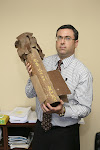It is too early to say anything definitive about the Hamas decision to apparently break the ceasefire and attack an Israeli position, except that if it is true, as reports indicate, that Hamas militants came through a tunnel and carried underground and back into Gaza a live Israeli captive, then this moment could represent not another terrible, dispiriting incident in a terrible, dispiriting mini-war, but a fairly decisive turning point in which all swords are unsheathed.
This is assuming—as seems probable, but not 100 percent certain—that this raid is even what the Hamas leadership wanted (for what it's worth, its leaders, at the moment, seem to be owning this raid, suggesting that they are indeed doubling down in their war on Israel). If the events of earlier today happened as initial reports depict, then Israel will consider this incident an engraved invitation from Hamas to launch something close to a full-scale invasion of Gaza. Here are the factors that could lead Israel to decide to go all-in:
a) The compact between the Israeli army and Israeli parents is simple: You give us your sons, and we will do whatever we can to keep them alive. This includes conducting operations that get other soldiers killed. There will be near-unanimity in Israel that this soldier should be rescued, regardless of price to Israel, or certainly to the Palestinians in Gaza.
b) There is near-unanimity in Israel already that Hamas represents an unbearable threat. Add in the perfidy of a raid conducted after a ceasefire went into effect and near-unanimity becomes total unanimity. The most interesting article I've read in the past 24 hours is an interview with the Israeli novelist Amos Oz, the father of his country's peace-and-compromise movement, who opened the interview with Deutsche Welle in this manner:
Amoz Oz: I would like to begin the interview in a very unusual way: by presenting one or two questions to your readers and listeners. May I do that?
Deutsche Welle: Go ahead!
Question 1: What would you do if your neighbor across the street sits down on the balcony, puts his little boy on his lap and starts shooting machine gun fire into your nursery?
Question 2: What would you do if your neighbor across the street digs a tunnel from his nursery to your nursery in order to blow up your home or in order to kidnap your family?
With these two questions I pass the interview to you.
The point is, if Amos Oz, a severe critic of his country's policies toward the Palestinians, sounds no different on the subject of the Hamas threat than the right-most ministers in Benjamin Netanyahu's right-wing cabinet, then there will be a national consensus that it is not enough to manage the Hamas rocket-and-tunnel threat, but that it must be eliminated if at all possible. This doesn't mean that the Israeli government wants to see the Hamas government in Gaza replaced. What it could mean is that the Israeli public demands that its leaders ensure them that the tunnel threat, in particular, is neutralized in a decisive way.
c) For Israelis who are immune, unlike Amos Oz, to the criticism of outsiders, the world's inability, or unwillingness, to understand the Hamas threat in the way that Oz (and most everyone else in Israel) understands it suggests that there is nothing Israel can do, short of national suicide, to stop the condemnation of their country. Which, of course, frees Israel, in their minds, to take whatever action it deems necessary to take. In other words, don't be overly surprised by news later today of a massive Israeli army reserve call-up.
More later, alas.

